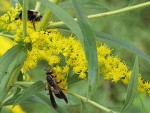 Food Democracy Now!, an advocacy group that includes farmers, writers, chefs, and lovers of good, sustainable food, is trying to raise support for that very thing in the new administration. The group has collected more than 85,000 signatures on a petition to change the factory food ways of the United States Department of Agriculture, but needs 15,000 more to make its goal. What is that goal? To get advocates for sustainability in the USDA as undersecretaries to its new head, Tom Vilsack, and to change the way America produces its food. Here’s part of its mission, in its own words:
Food Democracy Now!, an advocacy group that includes farmers, writers, chefs, and lovers of good, sustainable food, is trying to raise support for that very thing in the new administration. The group has collected more than 85,000 signatures on a petition to change the factory food ways of the United States Department of Agriculture, but needs 15,000 more to make its goal. What is that goal? To get advocates for sustainability in the USDA as undersecretaries to its new head, Tom Vilsack, and to change the way America produces its food. Here’s part of its mission, in its own words:
We seek to transform today’s system by advancing best practices in food production, animal husbandry, conservation of natural resources, renewable energy and soil preservation. Through these efforts we hope to stimulate local food systems, promote rural economic development, encourage a new generation of farmers and respond to the growing public demand for wholesome, fairly-produced food. We will also support candidates who advance this vision and who embrace common sense policies that respect our nation’s air, water, soil, livestock, food workers, consumers and family farmers.
The group’s declaration has been signed by Michael Pollan, Marion Nestle, Alice Waters, Dan Barber and Rick Bayless, among others. To learn about its picks for undersecretaries–a group Food Democracy calls “The Sustainable Dozen”–and to add your name to the petition, click here. And tell a friend.
Filed under: Grist For The Mill | Tagged: Alice Waters, Dan Barber, Food Democracy Now, Marion Nestle, Michael Pollan, Rick Bayless, Sustainability, Tom Vilsack | 1 Comment »






 Food Democracy Now!
Food Democracy Now!